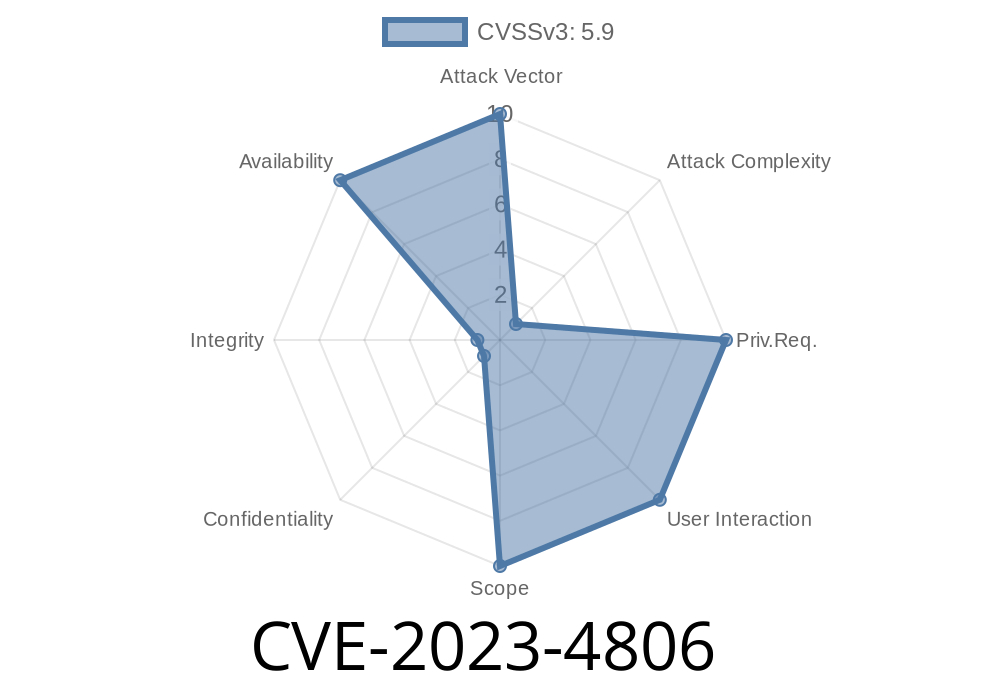In late 2023, a subtle and rare vulnerability was identified in the GNU C Library (glibc), specifically affecting the getaddrinfo function under very specific conditions. The issue, tracked as CVE-2023-4806, could cause certain applications to crash, potentially opening the door for denial of service via a use-after-free bug. Let's unpack how it happens, see an example, and discuss exploitation likelihood.
What is CVE-2023-4806?
This vulnerability resides in the getaddrinfo function of glibc—responsible for resolving host/domain names into IP addresses. The flaw is a *use-after-free*: certain data freed too soon might be accessed again, crashing the application.
But here's the catch: it only occurs under a very rare setup involving pluggable NSS (Name Service Switch) modules!
For CVE-2023-4806 to trigger, you need
1. A custom NSS module (often /lib/libnss_*.so)
Large number of address results:
The DNS/name resolution operation must yield a *lot* of IPv6 and IPv4 addresses and a canonical name.
If those conditions are met, glibc may free a memory buffer that still gets accessed, triggering a crash or, in very contrived scenarios, undefined (possibly exploitable) behavior.
Hypothetical NSS Module (structural pseudo-code)
// Suppose you have a minimal NSS module as shared object (.so):
// Implement only these two functions
enum nss_status _nss_example_gethostbyname2_r(...) {
// Code to return list of addresses (lots of them!)
// Fill hostent struct with many addresses
}
enum nss_status _nss_example_getcanonname_r(...) {
// Code to return a canonical name
}
// DO NOT implement _nss_example_gethostbyname3_r
Trigger from User Code
#include <netdb.h>
#include <stdio.h>
int main() {
struct addrinfo hints = {};
hints.ai_family = AF_INET6; // Request IPv6 addresses
hints.ai_flags = AI_CANONNAME | AI_ALL | AI_V4MAPPED; // Combo of risky flags
struct addrinfo *res;
int r = getaddrinfo("some.special.domain", NULL, &hints, &res);
if (r == ) {
// Process results
freeaddrinfo(res);
} else {
fprintf(stderr, "getaddrinfo: %s\n", gai_strerror(r));
}
return ;
}
If your system is using the special (broken/minimal) NSS module and "some.special.domain" returns a massive result set, this function may crash.
Denial of Service:
More realistic. A crashing application may be a risk if you combine this bug with a large input set in a multithreaded/high-load scenario.
Would most Linux distributions' defaults be vulnerable?
No. Standard NSS modules in glibc (like libnss_files, libnss_dns) use all the needed hooks.
Reference Links
- Red Hat Advisory
- glibc Bug 31031
- NVD Entry
- Sourceware (glibc upstream)
Who Should Care?
Developers:
If you use or integrate custom NSS modules, check that all the right hooks are present. This will not affect you unless your module is missing _nss_*_gethostbyname3_r.
Sysadmins:
If you run stock Linux distros, this is not your problem. If you deploy custom NSS modules, review them for compliance with recommended interfaces.
Pentesters/Security Folks:
This isn't likely to yield code execution, but you might check custom or legacy NSS modules on high-assurance systems for bugs like this.
Ensure all custom or third-party NSS modules implement the full set of gethostbyname hooks.
*If you don't know what NSS modules are, you're probably safe!*
Conclusion
CVE-2023-4806 is an intriguing, if obscure, bug in the depths of glibc. It demonstrates how intricate and hard-to-test paths in legacy code (like network name resolution) can still harbor surprises after decades. For most users, it's a non-issue. For systems mixing custom NSS with exotic setups, it's a good reason to review and update.
Have you ever written or audited a custom NSS module? This is a reminder: always implement the full intended interface, and watch out for surprising glibc behavior!
For further reading, refer to the official glibc advisory and keep your system libraries up to date.
*Written exclusively for you, simply explaining a rare but fascinating CVE in American English, with all references and example code.*
Timeline
Published on: 09/18/2023 17:15:55 UTC
Last modified on: 11/07/2023 04:22:59 UTC
